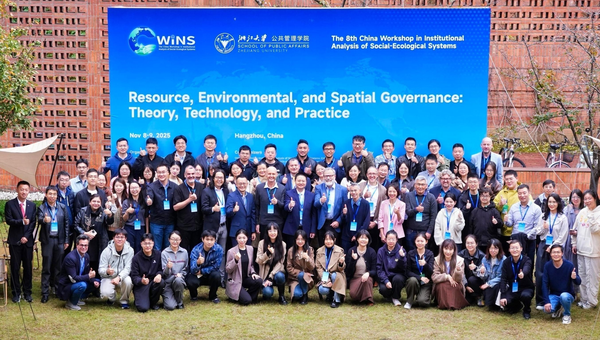ZJU Hosts the 8th CWINS International Workshop Successfully

This year's workshop gathered over 50 experts and scholars from more than 40 universities, research institutes, and related practitioner organizations across countries and regions including China, Germany, the United States, the Netherlands, Belgium, Austria, and Nicaragua. Focusing on critical issues in resource, environmental, and spatial governance against the backdrop of global environmental change and the pursuit of high-quality development, the conference featured 4 plenary sessions and 7 parallel panels. It covered cutting-edge topics such as theoretical innovations in governance, the application of big data and AI in environmental research, multi-scale social-ecological system management, ecological compensation policy mechanisms, and green and just urban-rural transitions, attracting over one hundred scholars, graduate students, and practitioners.

Experts at the conference noted that with intensifying challenges such as global climate change, biodiversity loss, and energy transition, resource and environmental governance urgently requires a systemic transformation in its concepts, institutions, technologies, and the relationships among governance actors.
Keynote presentations emphasized the need to deepen theoretical research from perspectives like polycentric governance, the logic of institutional evolution, and uncertainty and irreversibility. They called for promoting the convergence of knowledge from public administration, economics, political science, geography, ecology, and sociology within an interdisciplinary framework to achieve a holistic understanding of complex social-ecological systems and build long-term governance capacity.
In the parallel panel discussions, experts and scholars engaged in in-depth exchanges on topics such as the valuation of ecosystem services and the synergy of ecological compensation policies, the application of AI and remote sensing models in territorial spatial monitoring, institutional innovations in grassroots resource management, and interest coordination and social equity in the process of green, low-carbon development. Participants agreed that while new technologies like digitalization and smart systems bring
innovative methods and scenarios to governance, their effectiveness depends on a deep understanding of local contexts, behavioral mechanisms, and cultural factors. It was stressed that governance innovation must strike a balance between technological advancement and humanistic considerations.
The successful hosting of this workshop has further strengthened a high-level, sustained platform for international academic exchange in the field of resource, environmental, and spatial governance. It has advanced theoretical depth, methodological innovation, and practical development in these areas. The event makes a positive contribution to modernizing China's governance system and capacity for resources and the environment and to promoting a modernization where humans and nature coexist in harmony.
